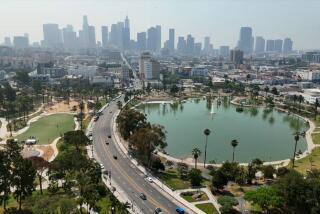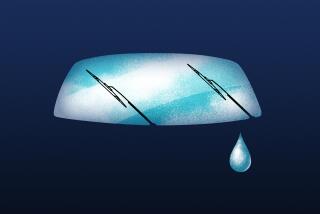When Life Was a Cherry-Red Corvette on the Wide Open Road
- Share via
When you live in a city long enough, the streets become haunted. As you turn a certain corner, pass a certain house, the past rises before you, within you, as if conjured. Specters of joy or regret, fear or giddiness appear in varying degrees of solidity--some elusive wisps of memory, others as vivid and real as a street light.
Along Wilshire Boulevard there are several miles that I cannot travel in the present. Whenever I drive from just east of Robertson to Camden, no matter the time or the day, no matter my mood or the weather, always it is the end of summer 5 1/2 years ago, always the sky is a high luminous blue with Fragonard clouds and I am sitting in a cherry-red 1963 Corvette convertible while my friend Richard Rouillard does his best to avoid ever using the brake pedal.
It is a workday, and I am playing hooky because he had called early in the morning to announce that he was almost done with the drug infusion that had kept him bedridden for several days and he wanted to Go Shoppin’. At Barneys. Richard almost always spoke in capitals, except when he spoke in italics, and his verbal punctuation also tended to the baroque--dashes, semicolons, colons and exclamation points. Difficult to hear early in the morning; impossible to refuse.
The nurse was still there when I arrived, unhooking the IV from the shunt that protruded from Richard’s chest. From his heart. Richard had been diagnosed with HIV long before I met him, had suffered from a seemingly endless variety of AIDS-related illnesses for as long as I had known him, but because of who he was, I don’t think it ever occurred to me that he would die. Until I saw that shunt. It stopped me in the doorway. It took my breath away. It still does.
“Free at last, thank the Lord, I am free at last,” he said, pulling on his shirt. The nurse made noises about taking it easy, which he waved away like the smoke from his cigarette. In minutes it seemed we were getting into the car. There were no seat belts. “Seat belts?” he said. “Honey, this car ain’t built for seat belts.”
And with an almost redundant squeal of rubber, we were off.
By the time we hit Wilshire, I swear we were doing 60. I had braced myself, feet planted, arms locked, for the crash I knew was inevitable, but Richard, Richard was sailing along, one hand on the wheel, the other waving off anyone--pedestrians, other drivers--who seemed even close to getting in his way. One light after another flashed amber, and he floored it, his head thrown back, his mouth wide in a great roar, like a lion, like a warrior. He turnedto me and the roar became laughter, huge laughter, unassailable, unstoppable, unquenchable laughter.
And for a moment, all other sound stopped, and the panic in my chest loosened like a knot undone. For a moment, it was as if we were part of a painting, or a novel, part of some glorious movie. Richard had always seemed larger than life, and in that moment, he seemed then larger than death. In that moment.
He wasn’t, of course. None of us are. That was the last time he drove the Corvette--soon he wasn’t physically strong enough to work the stiff pedals. He died about six months later, almost five years ago, which seems impossible. That he has been gone for five years.
I don’t get into Beverly Hills that often, and so whenever I find myself on that stretch of Wilshire, his ghost takes me by surprise. It is such a gorgeous thing, Richard’s ghost. With his head thrown back in that cherry-red car streaking past the glittering storefronts, the startled faces. The sound of his war whoop swelling into that wide-open ungentle laugh.
*
Mary McNamara can be reached at [email protected].
More to Read
Sign up for The Wild
We’ll help you find the best places to hike, bike and run, as well as the perfect silent spots for meditation and yoga.
You may occasionally receive promotional content from the Los Angeles Times.







